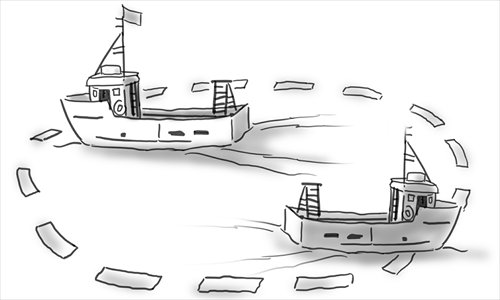Ambiguity helpful in S.China Sea disputes

Illustration: Liu Rui/GT
Recent years have seen increasing wrestling, both overt and covert, around the South China Sea disputes. With the US moving out of shadows into the spotlight, the tension between Beijing and Washington exacerbates. For countries sandwiched between the two major powers, there is less wiggle room for them to maneuver, and they are pressed to take sides. Once a crisis erupts in the South China Sea, no one can stay out of troubles. The reason why the tension is coming to a head is because the US is downplaying the creative ambiguity in the South China Sea.
The US is adept at taking ambiguous positions in its foreign policy. For instance, Washington has long insisted on ambiguity on the Taiwan question by striking a balance between the mainland and Taiwan. This can maximize US interests on both sides. Take the Diaoyu Islands dispute. Washington says it won't take sides between China and Japan, but it also claims the islands fall under the protection of the US-Japan bilateral security treaty. Washington is a master of its balancing act.
As to the South China Sea disputes, the US, an outsider, claims it doesn't take a position on the sovereignty disputes over the islands, but it has never stopped challenging and even confronting China over the matter. Washington's deeds are a far cry from its words. Moreover, Washington's acts in the South China Sea are leaving itself less chance to play the card of ambiguity. Under such circumstances, China's backlash is a normal response.
US high-ranking officials often accuse China of taking a vague policy over the South China Sea disputes and there is an urgent call for China to elaborate on its nine-dash line. China's South China Sea claim seems being stigmatized. As a matter of fact, China adheres to creative ambiguity over the South China Sea disputes, by virtue of which the region has remained peaceful and stable over the past decades.
China sticks to principles and maintains flexibility while defending its sovereignty in the South China Sea, the kernel of which is to avoid physical conflicts in the region. China's "ambiguity" in its South China Sea claims has contributed to the formation of a positive regional dynamic in which all claimants are able to be committed to social and economic development while the risks of territorial disputes can be reined in. If others disregard the advantages of an ambiguous policy and historical background, but push to clarify every detail, the results will probably be the opposite of what they expect.
China can make clear its claims from a legal perspective, but it keeps some ambiguity because as a country that bends itself to the peace and stability of the South China Sea, China eyes the big picture of geopolitics in spite of defending national interests.
But the problem is that countries like the US and the Philippines are challenging China's bottom line, disregarding the harm their provocations have brought to regional stability. The US conducted close-in surveillance of China while the Philippines, backed by the US, arbitrarily filed a case against China in the UN tribunal over the South China Sea disputes. As a result, China has to reinforce its management over the South China Sea as a response to the threats.
Once China clarifies the legal status of the nine-dash line, the US as an external power will find it hard to bargain with China over certain matters, and the Philippines will have to seriously consider the consequences if it refuses to return the islands and reefs of the Nansha Islands it occupies.
The South China Sea disputes are complicated. Taking an ambiguous policy is not the best option, nor the worst. If we allow more ambiguity in the South China Sea disputes, the parties involved will have more room for maneuvering.
The author is a maritime scholar. opinion@globaltimes.com.cn Follow us on Twitter @GTopinion